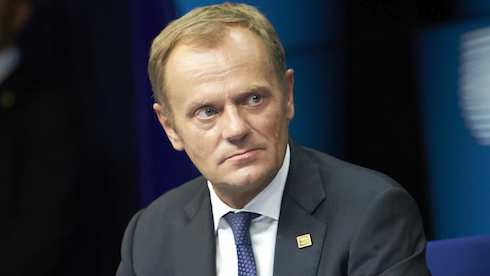Poland's premier has been one of the frontrunners in this race ever since Angela Merkel started pondering who might replace Herman Van Rompuy. Tusk's credentials as unwavering Europhile are rock-solid. His manners - worldly. His political skills - enviable. Over the last seven years he has won a series of elections in Poland, sometimes extricating himself from very tight corners. A master of political manoeuvering and a darling of the European commentariat.
The point is how he'll use his skills and his experience in his new faculty. Perhaps he will try to stiffen Europe's stance towards Russia. Perhaps his criticism of the EU's climate change policies will have some impact. However a different scenario is equally likely: Tusk might soon become one of those boring, ineffective, 'deeply concerned' EU officials, bragging about his masterful command of Eurospeak.
A few days before the Brussels summit Tusk got the backing of David Cameron, albeit the Polish prime minister may be regarded as antithetical to his British counterpart. Cameron is a constant nuisance, whereas Tusk enjoys being complimented and back-patted by prominent Eurocrats. Cameron is a selfish EU-basher (as the mantra goes), whereas Tusk is a staunch Europeanist.
Representing a non-eurozone country, Tusk never had to openly address the thorniest issues in the EU: the future of the common currency, the role of the ECB, bank bailouts, austerity policies and myriad other controversies through which eurozone leaders were forced to navigate. Thus it was easier for him to gain Angela Merkel's confidence. She saw him increasingly as a safe pair of hands.
[[Tusk is labelled in most Western media as 'economic liberal' and 'fiscal hawk']]. Apparently he would never ally himself with spendthrift and undisciplined Southerners. However, this image might be misleading. His economic policies in Poland have been far from liberal. Tusk's government increased taxes, didn't rein in welfare spending, did nothing to cut red tape. But it pushed quite vigorously (and successfully) to nationalise pension funds. Significantly, Leszek Balcerowicz, the iconic author of free-market reforms at the beginning of the 1990's, is one of the fiercest critics of Tusk's economic record.
Admittedly, Poland's economy is doing much better than Greece's. For the last few years GDP growth has been surprisingly stable and public debt relatively low (due more to creative accounting than budgetary restraint). Nevertheless these are actually the only economic indicators Tusk can be proud of. Unemployment rate is stuck at 10 percent. Poland trails its neighbours in most global rankings measuring economic freedom. Young, bright minds leave Poland in droves.
And voters flock away from Tusk as well. In recent polls Law and Justice, the main opposition party, has a clear lead over the Civic Platform. Ewa Kopacz, the current speaker of the Diet, blindly loyal to Tusk, is reportedly his pick to take over both the party and the prime minister's post. That would be a very risky gamble: she doesn't seem to have many friends in the Civic Platform, let alone loyal followers.
Moreover there are many disgruntled party members who will certainly attempt to stop Kopacz's candidacy - Grzegorz Schetyna, former deputy prime minister and Tusk's longstanding rival, being one of them. The upcoming struggle for party leadership will be a no-holds-barred bloodbath. In the boldest scenario the Civic Platform might even disintegrate. Maybe that's why Jarosław Kaczyński, Law and Justice leader and former prime minister, is so glad to see Mr. Tusk heading for Brussels.
Was this article useful? If so we are delighted!
It is freely available because we believe that the right to free and independent information is essential for democracy. But this right is not guaranteed forever, and independence comes at a cost. We need your support in order to continue publishing independent, multilingual news for all Europeans.
Discover our subscription offers and their exclusive benefits and become a member of our community now!












